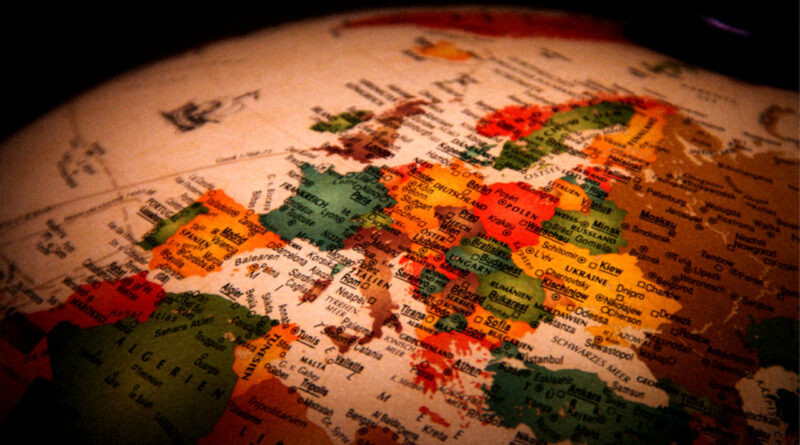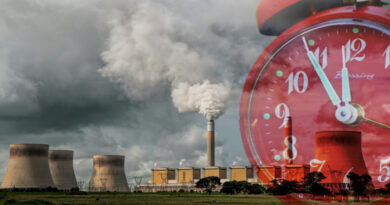The Real Reason We Are Not Sustainable
There is good news on the climate change front. Brilliant minds are advancing technologies intended to conserve the environment and support sustainability. Some of them already available on the market are:
Flexible, light, and portable printed solar panels lower the cost of solar power.
Notpla (one of the 2022 winners of the Earthshot Prize) uses seaweed to manufacture a fully biodegradable alternative to plastic packaging.
Solar-powered SOURCE hydropanels produce water using solar power.
There is more. I recently learned that there are currently nine net zero countries; countries that emit as much carbon dioxide as they absorb. These countries do NOT contribute to climate change. What great news!
Then, I read the list. The net zero countries are:
Bhutan
Suriname
Tuvalu
Niue
Nauru
Kiribati
Tonga
Saint Helena
Wallis and Futuna Islands
All of the net zero countries are small or very small. None of them is industrialized and eight of them have a well-preserved natural environment. Some engage in sustainable (small-scale) farming or fruit growing.
Only one, Tuvalu – not an industrialized nation, with less than 12,000 citizens – is actively working on switching from fossil fuels to wind and solar power.
Not one of the nine net zero countries is an example of an industrialized nation that became fully sustainable and is currently powered entirely by renewable energy.
As for the remaining 195 countries in the world, their advancement toward climate goals is murky.
The top ten renewable energy producers are:
China
USA
Brazil
Germany
United Kingdom
Thailand
Japan
India
Italy
Indonesia
Impressive. But, according to World Population Review, not one of the top renewable energy producers is among the top users of renewable energy.
The top 10 renewable energy users are:
DR Congo – 96.24%
Somalia – 95.03%
Central African Republic – 91.26%
Uganda – 90.22%
Gabon – 89.88%
Ethiopia – 88.92%
Liberia – 87,24%
Guinea-Bissau – 86.24%
Tanzania – 85.22%
Burundi – 84.77%
Just like in the case of the net zero countries, not one of the top users of renewable energy is a developed, industrialized country.
According to the World Population Review, the top 10 most developed countries (as measured by United Nations Human Development Index) are:
1. Norway
2. Ireland (tie)
2. Switzerland (tie)
4. Iceland (tie)
4. Hong Kong, China (SAR)(tie)
6. Germany
7. Sweden
8. Australia (tie)
8. Netherlands (tie)
10. Denmark
Out of the ten most developed countries, only three are currently using a significant percentage of renewable energy.
Norway uses over 62%
Ireland over 12%
Switzerland over 24%
Iceland over 81%
Hong Kong, China 0.23%
Germany over 17%
Sweden over 52%
Australia over 10%
Netherlands over 8%
Denmark over 37%
The top 3 renewable energy producers are using
China over 14% of renewable energy
USA over 10% of renewable energy
Brazil over 47% of renewable energy
The percentages in this category illustrate well, the discrepancy between the progress of Brazil (population over 215,000,000) in renewable energy use as compared with the United States (population over 338,000,000) and China (population over 1,4 billion).
Here are the obvious insights:
- Net zero countries are carbon neutral primarily because theirs are developing countries with little or no industry and a well-preserved natural environment.
- The top renewable energy adopters are developing countries with relatively little or no industry.
- The top renewable energy producers are developed, industrialized countries.
The Real Reason We Are Not Sustainable
Most developed countries utilize relatively little renewable energy which is likely explained by their more complex infrastructures. Making the switch to renewable energy for highly industrialized countries is more complicated, costly, and time-consuming.
Based on the numbers, unrelenting industrial growth causes the most carbon emissions. The pollution caused by industrial power countries endangers the whole globe. It takes too long for highly industrialized countries to convert to renewable energy.
As the examples I named earlier demonstrate, there are several effective approaches to lower carbon emissions. Since ours is a highly-developed country, for us to lower carbon emissions we’d have to:
1/ adapt our power grid to expand the use of renewable energy
2/ restore forests, plant trees, and naturally cultivate the soil to improve our carbon capture capacity
3/ eliminate factory agriculture and factory farming permanently
4/ switch to a vegan diet
5/ lower energy use
6/ suspend non-essential industries entirely
7/ eliminate some types of waste completely, while changing the way we dispose of biodegradable waste
8/ transform societal habits from consumeristic to sustainable
Such an approach would allow us to dramatically reduce our damaging environmental impact, reduce our carbon emissions, and slow down climate change relatively quickly.
Although the principles of such a change are sound, the measures are also somewhat draconian and would have many opponents from the general public and industries to economists and business leaders. Worse, there are a few other factors that would make such a change extremely difficult.
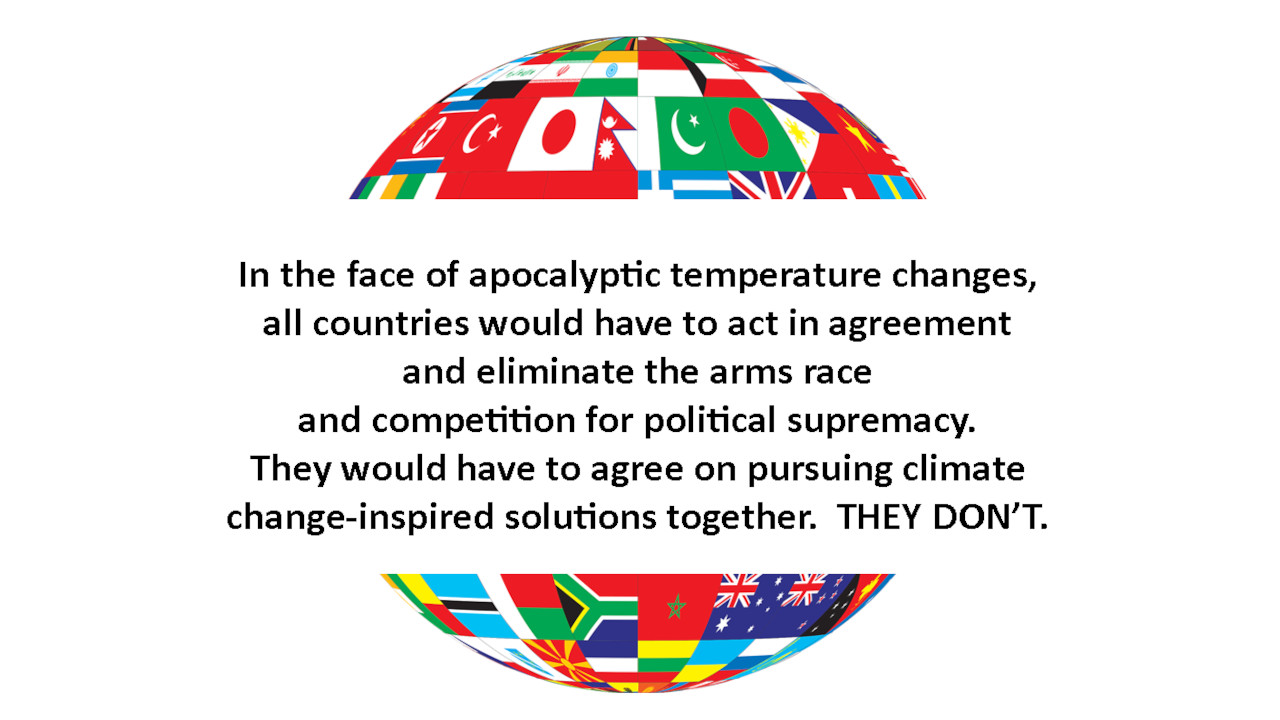
In the face of apocalyptic temperature changes, all countries would have to act in agreement and eliminate the arms race and competition for political supremacy. They would have to agree on pursuing climate change-inspired solutions together. They don’t.
*
As you have surely noticed the topic of climate change is close to my heart. I always believed that what’s at issue is environmental conservation and restoration, renewable energy, getting rid of plastic, and a better way to dispose of waste. I wonder for many years now what’s stopping us from becoming a net zero country and entering the era of sustainable living. I don’t anymore.
The Real Reason We Are Not Sustainable
None of the most emphasized factors is the reason why we’re not carbon neutral. The climate warriors – and I – are focused on details to the detriment of the larger picture. It’s the larger picture that prevents the switch to renewable energy.
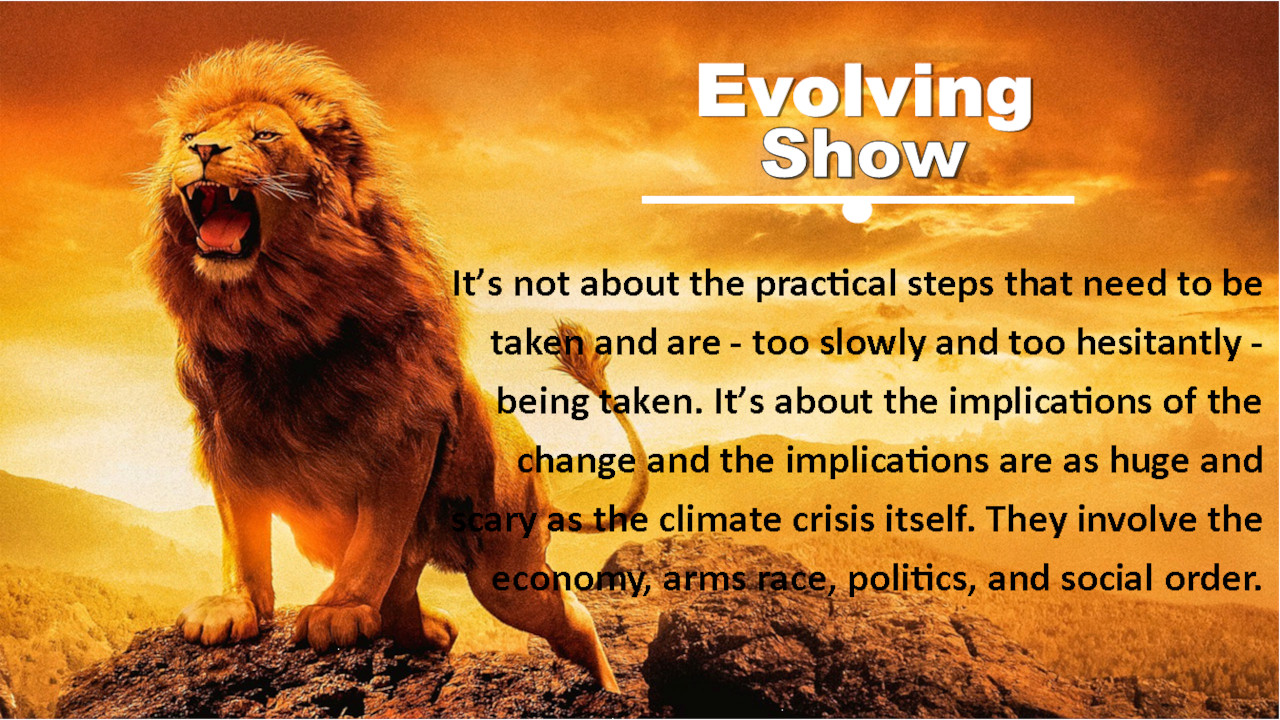
It’s not about the practical steps that need to be taken and are – too slowly and too hesitantly – being taken. It’s about the implications of the change and the implications are as huge and scary as the climate crisis itself. They involve the economy, arms race, politics, and social order.
Sustainability would significantly limit industry, commerce, employment, and tax revenue. A massive reduction in tax revenue would negatively impact our defense systems. That would put us at a disadvantage in international relations and make us vulnerable to foreign invasion. A high rate of unemployment could cause internal instability and potentially lead to a collapse of existing social structures.
The Real Reason We Are Not Sustainable
Long story short, with the current political status quo in place, the transition the world desperately needs ASAP to delay climate change will have many, not climate-related consequences. It is my personal belief that the awareness – and fear – of these predictable consequences is the real obstacle in the way to carbon neutrality.
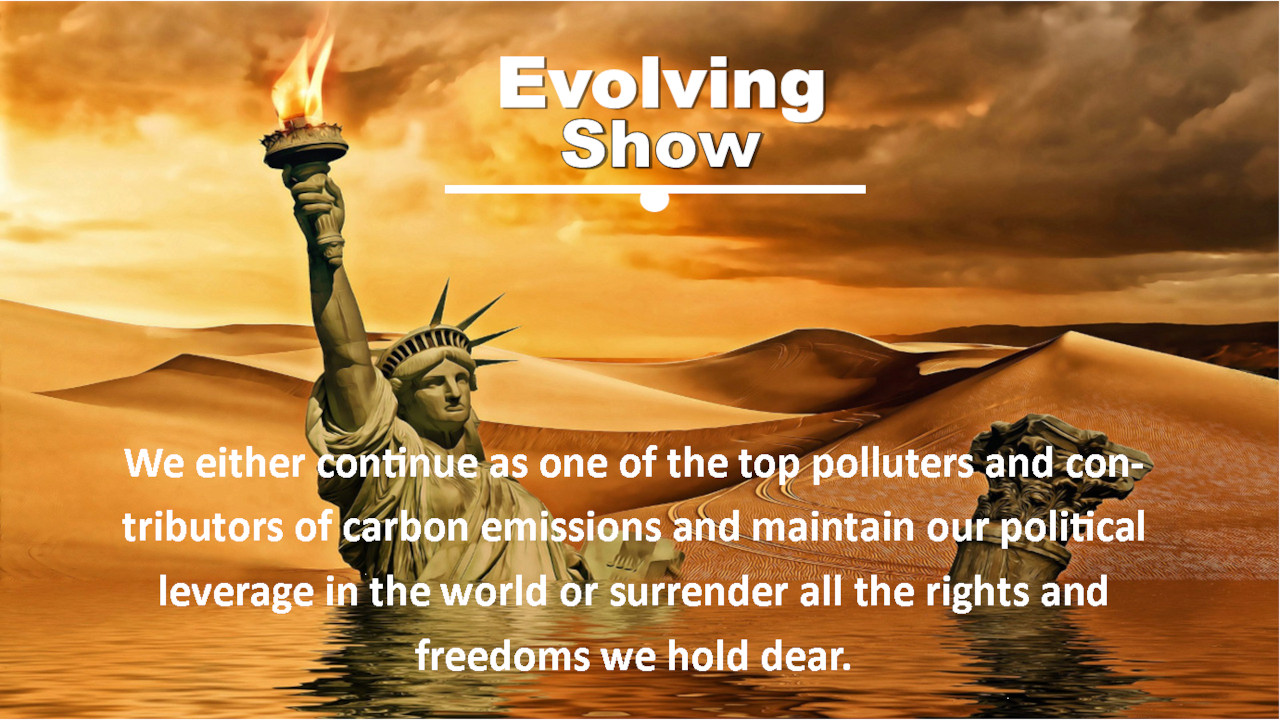
As it is, we either continue as one of the top polluters and contributors of carbon emissions and maintain our political leverage in the world or surrender all the rights and freedoms we hold dear.
Option one will accelerate climate change and may eventually result in a total collapse of our civilization.
Option two could potentially result in a different kind of apocalypse altogether.
*
Think of the current political situation in the world and focus just on the “highlights”. Iran is unstable. The actions of North Korea are alarming. Relations with China are fragile. Most notably perhaps, the war in Ukraine raises many red flags.
The world is kept in balance thanks to the established power differential. This existing power differential gives the United States leverage in international matters. Even so, with the existing power differential and our political supremacy, we can’t resolve current political conflicts and threats.
Yes, there are several international diplomatic organizations. As it became painfully apparent because of the war in Ukraine, these organizations have no enforcement power. (An idealist would have thought that humanitarian and environmental reasons outweigh political agendas and are more than sufficient to put an immediate stop to the war in Ukraine.) As it turned out, the United Nations have no enforcement power and can’t stop a war.
Think about it, there are hundreds of countries in the world. Each focused on their own agenda. Each with internal and external tensions. All too self-involved to consider the obvious.
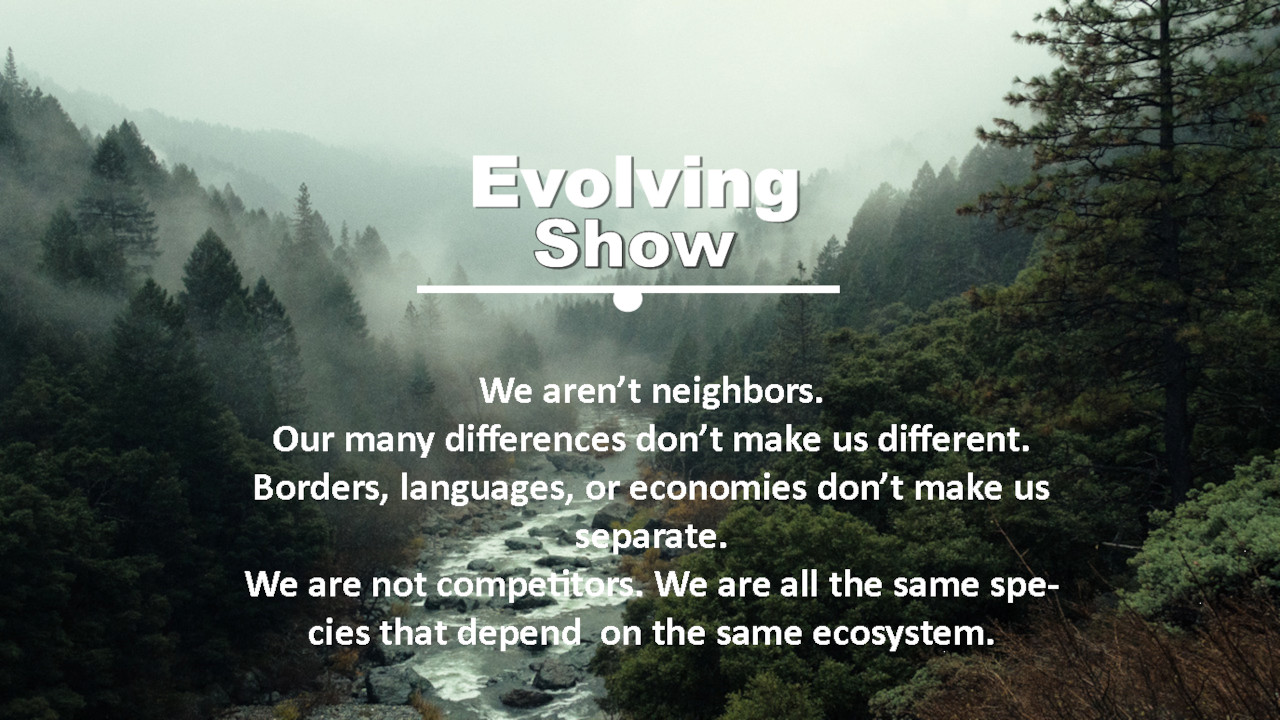
We aren’t neighbors. Our many differences don’t make us different. Borders, languages, or economies don’t make us separate. We are not competitors. We are all the same species that depend on the same ecosystem.
And yet, we are unable to put our differences aside, give up our political agendas, come together and act together even in face of climate crisis! And THAT’S the real reason we are not sustainable.
The Earth isn’t safe. Not even net zero countries are safe. (They can’t protect themselves from the global consequences of environmental abuses committed by other countries.) The issue of climate change is global. There is no safe place.
*
Carbon emissions are causing climate change and we wonder why we didn’t switch to renewable energy, yet. All this time we were thinking about environmental issues, while the actual reason for the delay likely isn’t economic or technological but political. What’s at stake is maintaining political stability and retaining political supremacy. Both of which are easier with fossil fuels.
Temperatures continue rising at a catastrophic rate. Meanwhile, we are stuck in a catch-22.
#EvolvingShow #SustainabilityPodcast #ClimateChange #RenewableEnergyStats #NetZeroCountries #EvolvingShowPodcast #SturmEnrich
This episode of the Evolving Show podcast is available also on:
Spotify
Apple Podcasts
Anchor
Sticher
Pandora
iHeartRadio
To leave a comment scroll down the page. No login required!

